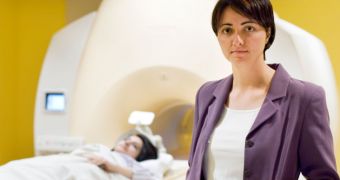According to the results of a new scientific study, it would appear that real-time brain feedback is helping people manage their thought more efficiently. The research, carried out using brain-imaging technology, opens a new avenue for research in neuroscience.
Experts with the University of British Columbia (UBC), in Canada, demonstrated conclusively that it's possible for average individuals to gain a better control of their own thought processes. All that is needed for that to become reality is for the people to see how their brain changes as they think.
For this exact purpose, the team used functional Magnetic Resonance Imaging (fMRI), a technique that allows the display of neural activity patterns in the human brain. The way it works is it tracks the flow of blood into particular neural pathways.
As such, experts can determine which area of the brain is involved in which type of action. This type of studies was what enables neuroscientists to map out the brain, and determine what portions of it control the five senses, motion, speech, and so on.
UBC scientists say that this is the first time ever when a team used real-time fMRI on patients. For these experiments, the target of the fMRI machine was the rostrolateral prefrontal cortex (RLPFC), a region of the brain that past studies demonstrated is involved in higher-order thoughts.
“Just like athletes in training benefit from a coach’s guidance, feedback from our brain can help us to be more aware of our thoughts,” explains the coauthor of the new study, professor Kalina Christoff.
“Our findings suggest that the ability to control our thinking improves when we know how the corresponding area in our brain is behaving,” adds the expert, who holds an appointment with the UBC Department of Psychology.
“When participants saw their brain reacting to their thoughts, they knew whether they were performing the task well or poorly, and they could adjust their thoughts accordingly,” argues Graeme McCaig.
“As a result, participants who received the real-time feedback were able to focus on the mental task more consistently,” adds the expert, who was also a coauthor of the work. He is a graduate of the UBC Department of Electrical and Computer Engineering’s Human Computer Interaction specialization.
Details of the new investigation were published in the April issue of the esteemed medical journal NeuroImage. Using these data, it may be possible to create new therapies against mental conditions such as depression, anxiety, and obsessive-compulsive disorders.

 14 DAY TRIAL //
14 DAY TRIAL //